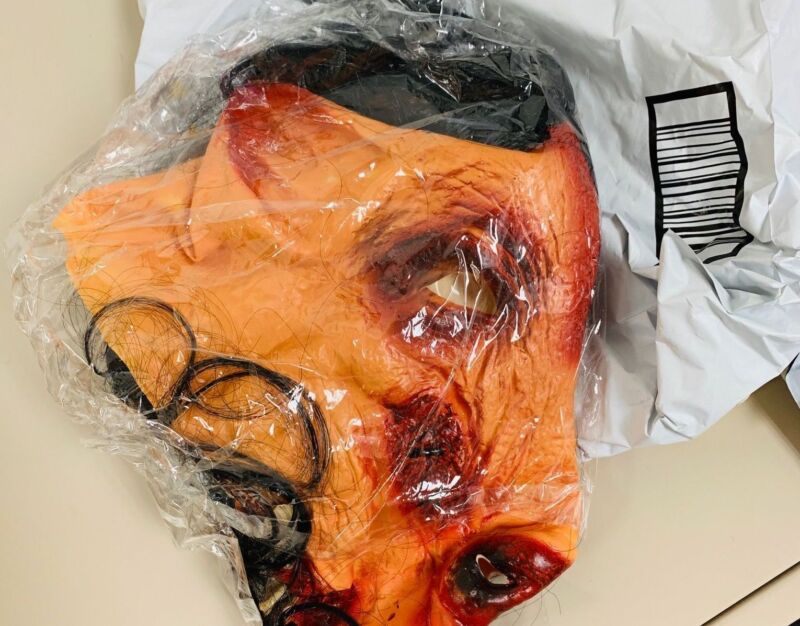“What we know about Jeff Bezos is that he doesn’t like losing."
ERIC BERGER - 7/21/2021, 1:30 PM
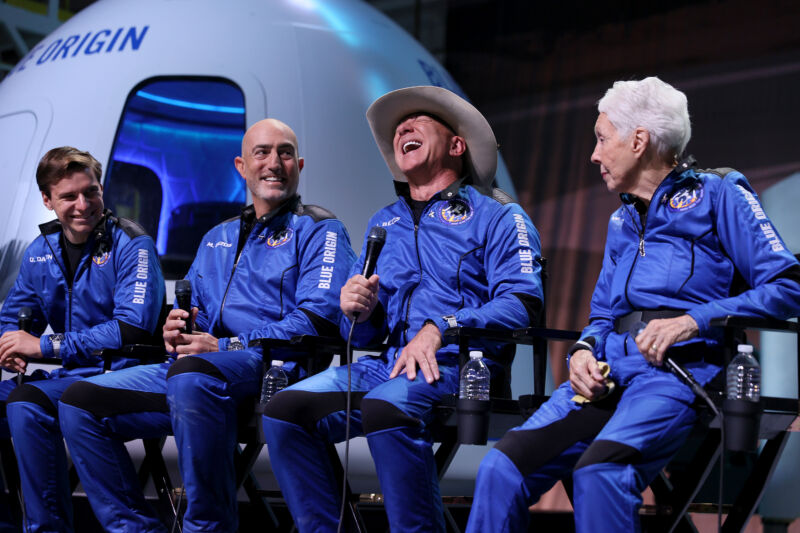
Enlarge / Blue Origin’s New Shepard crew, Oliver Daemen, Mark Bezos, Jeff Bezos, and Wally Funk hold a press conference after flying into space in the Blue Origin New Shepard on July 20, 2021 in Van Horn, Texas.
Joe Raedle/Getty
LAUNCH SITE ONE, Texas—Jeff Bezos burst from his spacecraft with a smile on his face as wide as the brim of the cowboy hat atop his head.
The founder of Amazon fulfilled a lifelong dream of flying into space Tuesday morning aboard a rocket and capsule he personally funded. During a few minutes of weightlessness, Bezos and his brother Mark had floated around the New Shepard capsule alongside aviation pioneer Wally Funk and an 18-year-old customer, Oliver Daemen. They tossed Skittles candy into one another’s mouths and enjoyed the view.
“Best day ever,” said Bezos, 57, after landing safely beneath three parachutes. “My expectations were high, and they were dramatically exceeded.”
Not everyone was thrilled by the adventures of the richest person in the world. With his brief 10-minute flight, Bezos provoked sharply divided reactions. Some people even wished Bezos had launched and never come back.
These critics expressed frustration with Bezos for busting unions and not treating Amazon employees well. Environmentalists despaired that as the world burns from climate change and other calamities, Bezos responded by jetting into space. And with all of his wealth, Bezos offered an inviting target for those who loathe ultra-rich billionaires and want them to pay their fair share of taxes. Criticism of Bezos spanned the ideological divide, from Tucker Carlson on Fox News to liberal Congresswoman Alexandria Ocasio-Cortez.
Meanwhile, within the space community, people mostly celebrated Bezos’ flight as the dawn of the private spaceflight era, which further opens the high frontier, with both Blue Origin and Virgin Galactic starting regular spaceflight service.
Scenes from launch day in Texas. Here, New Shepard rolls out to the launch site in the pre-dawn hours.
Blue Origin
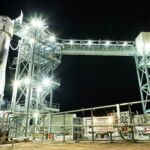
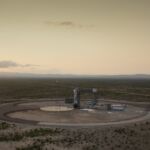
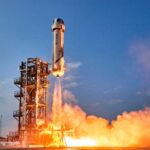
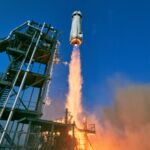
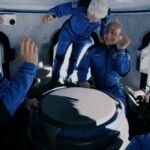
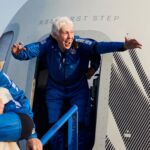

Neither side is necessarily wrong. It is reasonable to both be uncomfortable with Bezos' extreme wealth and what that means for society but also recognize that Blue Origin has advanced spaceflight.
The real question is whether Bezos will make good on his stated intent to use his immense wealth for the good of humanity. What the legion critics of Bezos and Blue Origin miss is that the company legitimately has the goal of ultimately saving planet Earth. While Tuesday’s flight was clearly self-serving for Bezos, Blue Origin has follow-on projects in the works to support moving heavy industry from the surface of our planet into space.
To set humanity on this environmentally sustainable path, Bezos has lavished funding on Blue Origin, investing about $10 billion in the spaceflight company so far, with more coming every year. However, what Bezos has not invested into Blue Origin is his personal time, nor the driven leadership that propelled Amazon to the top of the heap of retail.Advertisement
So after he returned from his spaceflight on Tuesday, what I most wanted to know is whether Jeff Bezos is all-in on space. He has the vision. He has the money. But at the age of 57, does he have enough years or willingness to ensure Blue Origin’s success? Or will he leave Blue Origin to flounder and instead mostly retire to his half-billion-dollar yacht after a suborbital joyride?
The jury is very much out.
The vision
Bezos has a compelling vision for space, and it is entirely genuine. From way back before his Amazon days, Bezos has been a true believer in the power of using space to improve life on Earth. Our planet, he says, is a garden to be preserved.
“This is the only good planet in the Solar System,” he said on Tuesday, repeating a line he has often used. “We’ve sent robotic probes to all of them, and this is the only good one. We have to take care of it. And when you go to space and see how fragile Earth is, you’ll want to take care of it even more.”
To accomplish this, Bezos founded Blue Origin in 2000 to build a “road to space.” This simply means bringing down the cost of launching rockets by reusing them over and over again. By lowering the cost of reaching space, Bezos seeks to move heavy industry off Earth. Instead of strip-mining our planet, he says, we should glean those resources from lifeless asteroids.
Our insatiable energy needs, too, might be met by space-based solar power farms. And finally, expanding into space will allow humanity to grow as a species, eventually populating orbital settlements near Earth and then other worlds. This unlimited opportunity for expansion would save humans from entering a stasis and from fighting for increasingly scarce resources on Earth.
Bezos is theoretically right about all of this. Today, roughly half the world’s population lacks access to reliable electricity and reasonably high living conditions. The only long-term means to bring this half of the world’s population up to a standard of living enjoyed by the developed world, without destroying the Earth, is probably accessing the bounty of resources in space.
FURTHER READING Jeff Bezos unveils his sweeping vision for humanity’s future in space
Building such a space economy and a spacefaring civilization will not happen overnight, though, and that's why Bezos views Blue Origin as a multi-generational effort. “Big things start small, and this is how it starts,” Bezos said Tuesday.
The company has a plan. It started small with the New Shepard system and learned how to reuse rockets. It is currently developing the much larger New Glenn rocket, which will essentially use the New Shepard design as its second stage. There are plans for even bigger rockets down the line, all to move more mass to and from planet Earth much more cheaply.
Yet this plan has unfolded very slowly, and Bezos has not pushed forward with the same determination displayed by his leadership of Amazon. Blue Origin remains very far from self-sufficiency. Bezos still must pump more than $1 billion into Blue Origin annually to keep the lights on. Even for the world’s richest person, this kind of financial backing does not seem sustainable.Advertisement
Making matters even worse for Bezos? He must compete with Elon Musk and SpaceX.
A rivalry that wasn’t
During the middle of the 2010s, after more than a decade of near silence, Blue Origin emerged from stealth mode with all appearances of becoming a formidable space company. It seemed probable that two titans of the tech industry, Jeff Bezos and Elon Musk, would now battle for supremacy in the space arena.
In late 2014, Blue Origin stunned the space industry by announcing that it had reached a deal to build rocket engines for United Launch Alliance, then the premiere launch company in the United States. United Launch Alliance selected Blue’s BE-4 engine for its new Vulcan rocket over an offering from Aerojet Rocketdyne, the blueblood propulsion company behind the majority of large rocket engines in US history.
About a year later, Blue Origin pulled off another feat by safely launching and landing the New Shepard rocket and capsule on its up-and-down suborbital mission. This marked the first time in history that anyone—country or company—had vertically launched a first-stage rocket into space and then landed it back on the ground.
The next month, in December 2015, SpaceX repeated this launch-and-landing feat with its orbital Falcon 9 rocket for the first time. From a technical standpoint, the Falcon 9 landing was much more significant, as it requires about 30 times more energy to boost a payload into orbit and complicated engineering to slow such a booster down and return it to the landing site. No matter: After the Falcon 9 flight, Jeff Bezos cheekily tweeted, “Welcome to the club” to Musk and SpaceX.
Musk was decidedly not amused, but this banter underscored the emerging rivalry—Bezos and Musk, billionaire versus billionaire, on a quest to build reusable rockets and remake the space industry. Back then, it all seemed so clear: The 21st-century space race would be run by Blue Origin and SpaceX, and it was going to be a hell of a thing to watch.
Only it hasn’t been. There has been no race. Since the end of 2015, Blue Origin has launched its suborbital New Shepard system just 15 more times, an average of fewer than three missions per year. Only this week did humans finally get on board for a launch. As for the BE-4 engine, after promising it would be ready for spaceflight in 2017, Blue Origin has yet to deliver a flight-ready version to United Launch Alliance more than four years later.
SpaceX, by contrast, has ascended. Since December 2015, the company has successfully flown more than 100 orbital missions. It has developed and flown the world’s most powerful rocket, the Falcon Heavy, and may soon debut its still more titanic Starship launch system. With the Starlink Internet constellation, SpaceX now operates more satellites than any nation or company in the world. And in 2020, thanks to SpaceX, NASA broke its dependency on Russia for human spaceflight. NASA astronauts now ride to space in style inside the sleek Crew Dragon spacecraft.
Blue Origin has also lost out when it comes to large government contracts worth billions of dollars, something Bezos craves as he seeks to find some return on his massive investment in Blue Origin. In 2020, the Department of Defense said it would only allow United Launch Alliance and SpaceX to bid on national security launch contracts in the mid-2020s. Blue Origin protested and lost. Then, in April, NASA chose SpaceX alone for a prestigious Human Landing System. This came after Bezos showily unveiled his company’s “Blue Moon” lander in 2019. Blue Origin protested this, too, and a decision is expected in early August. It would come as a surprise if Blue Origin succeeds.
In short, a once-promising space race has become something of a damp squib. In late 2019, while reporting for my book on the origins of SpaceX, Liftoff, I asked Musk why he thought Blue Origin had fallen behind. “Bezos is not great at engineering, to be frank," Musk replied.
King of buildings
The road to Launch Site One travels north out of the dusty, time-worn town of Van Horn in West Texas. The two-lane road slaloms back and forth, twisting between weathered mountains like the rattlesnakes slithering through the nearby desert.
The mountains are green here, and Bezos owns a large chunk of them, with more than 300,000 acres under his control, including the Sierra Diablo range to the west of US Route 54. Where the mountains don’t climb hundreds of meters above the desert, a vast sea of scrubby flatlands spread into the distance, broken only by gullies. These are mostly dry, but they can fill quickly during nocturnal thunderstorms that brighten the night sky with brilliant lightning.
FURTHER READING Behind the curtain: Ars goes inside Blue Origin’s secretive rocket factory
Here, on about 80,000 acres, Blue Origin has built a launch and landing site for New Shepard, as well as test facilities for its rocket engines. A drive around Launch Site One, with its crisp white buildings rising above the desert, underscores the fact that Bezos is unquestionably good at building space infrastructure. The company has always been impressive in this way.
Bezos founded Blue Origin near his Amazon headquarters in Seattle, and for the first few years, it served mostly as a think tank exploring different ways to get into space. But soon, Bezos and a small team of engineers settled on the New Shepard plan to demonstrate reuse. During the first half of the 2010s, Blue Origin looked to be moving rapidly, as it built BE-3 rocket engines and New Shepard boosters. Visitors remarked that the burgeoning factory in Kent, Washington, had the feel of SpaceX’s frenetic headquarters in California.
In recent years, Blue Origin has kept on building things. In 2017, Blue Origin said it would invest $200 million to build a BE-4 rocket engine factory in Northern Alabama. Later that year, the company said it had nearly completed construction of a massive manufacturing factory in Florida for its New Glenn rocket. Blue Origin has also expanded its factory in Washington.
All told, Blue Origin now has millions of square feet of facilities. Currently, it just has precious little rocket hardware. For all of its construction efforts, Blue Origin has yet to deliver a BE-4 engine to United Launch Alliance. And the massive New Glenn rocket, about which Bezos has been talking for a decade, remains at least a couple of years away from its first flight.
FURTHER READING Increasingly, the ULA-Blue Origin marriage is an unhappy one
The industry has taken notice, with popular memes such as United Launch Alliance chief Tory Bruno repeatedly asking, “Jeff, where are my engines?” Others show the huge New Glenn factory in Florida, which appears to be mostly empty.
As Blue Origin has fallen behind SpaceX in recent years, morale has declined, according to multiple sources. Bezos pushed the company further from its roots in late 2017 by sidelining long-time president Rob Meyerson and hiring a traditional aerospace veteran, Bob Smith, to become chief executive. Coming from Honeywell, Smith instituted a more bureaucratic management style, and Blue Origin’s progress seemed to slow significantly. Whereas Bezos' debut flight on New Shepard could have occurred as early as 2019, it slipped by months and eventually years. Critics of Smith’s plodding management style started referring to the company as “Blue Honeywell.”Advertisement
The decline in morale at Blue Origin coincided with a period when Bezos was increasingly distracted by making visits to Hollywood for Amazon Prime video, the assassination of Saudi writer Jamal Khashoggi (who worked for the Washington Post), a divorce from his wife MacKenzie, and more. He spent less time at the rocket company, and it suffered as a result.
The question is, now that Bezos has tasted spaceflight, will he become reinvigorated and pursue his ambitions with abandon?
“Losing to SpaceX cannot please him,” said Brad Stone, author of Amazon Unbound, a new book about Bezos and his retail empire. “What we know about Jeff Bezos is that he doesn’t like losing.”
However, Stone is not sure Bezos will take a strong hand at Blue Origin. Although Bezos seeded the company with principles, he also seeded dysfunction by installing a very different leader in Smith. Since 2017, Bezos has more or less let Smith run Blue Origin with freedom, and he may continue to do so. “It’s hard for me to see Bezos taking on a more prominent executive role at Blue Origin,” Stone said.
Space needs both
Both SpaceX and Blue Origin are about 20 years old now. Both companies were founded by brilliant men capable of being ruthless in their business practices. Both founders see humanity’s future among the stars. But so far, one company has prospered while another has dithered. The difference, I think, is that from the beginning, Elon Musk has been all-in on SpaceX. Even today, while Bezos is enjoying the billionaire life and planning voyages on his mega-yacht, Musk is living in a $50,000 house in rural South Texas to keep his Starship project on track.
What we cannot know is whether this spaceflight experience will change Bezos. Certainly, he seems to have come back from his space trip more concerned about climate change. Shortly after the flight, Bezos said of his priorities moving forward, “I’m going to split my time between Blue Origin and the Bezos Earth Fund.” He has already committed $10 billion to his climate charity.
Much of the spaceflight community would appreciate a renewed focus on space by Bezos. There is a hunger for an alternative to Musk, for a true competitor that everyone envisioned Blue Origin would become back in 2015. Quite simply, Musk rubs some people the wrong way. He does not always play well with others. Often, SpaceX looks to grind its competitors into dust rather than find partnerships. Where the industry would like to see soufflés, Musk is happy to break eggs on the way to space—anything to get the job done. Which, to be fair, SpaceX does more than any other company in spaceflight
.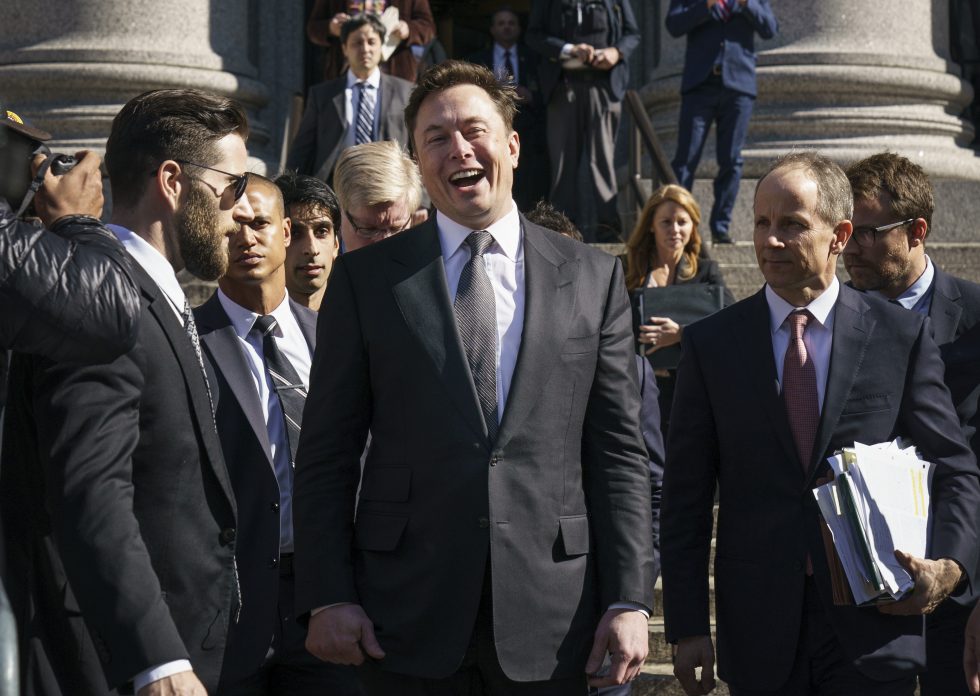
Enlarge / Elon Musk exits federal court on April 4, 2019 in New York City. He might be laughing at a Jeff Bezos meme.
Drew Angerer/Getty Images
NASA, the US military, and other industry companies would welcome Blue Origin with open arms if the company could only execute on its programs. Lori Garver, a former deputy administrator of NASA who has known both Musk and Bezos for more than a decade, says such a competition would be tremendously helpful.
"Throughout history, great rivalries in business, science, and technology have led to great advancements,” she told Ars. “Having two extremely wealthy individuals who have an interest and long-term commitment to developing a spacefaring civilization is likely to benefit us all.”
Garver cited Leonardo and Michelangelo, Edison and Tesla, and Gates and Jobs as historical examples of this dynamic at work, by which the power of two improved each other and the state of progress.
“Neither Blue Origin or Virgin Galactic appear to be much of a rival to SpaceX today, but the winner in the competition to expand the railroads and aviation weren't always obvious, either,” she said.
The verdict
If Bezos thinks about this or reflects on how Blue Origin has so far fallen short of SpaceX, he does not talk about it publicly. Two moments on Tuesday, after his historic spaceflight, suggest he may not do a whole lot about it regardless.
Two hours after Bezos and his fellow passengers landed, they climbed onto a stage near the launch pad to receive their “astronaut” wings. The event, billed as a “press conference,” instead saw Blue Origin’s Ariane Cornell ask softball questions about the flight. The answers were interesting, and Bezos obviously took deep satisfaction from the event. At one point, he removed a necklace he had worn during the flight, got down from the stage, and put it around his mother’s neck. It seemed to be his way of telling his mom he had fulfilled his childhood dreams.
After all of that, Bezos allowed for just three actual press questions to be asked. Two came from TV networks and the other from Reuters. Only one of the questions got near the troubles at Blue Origin, asking about timelines for future rocket development. Bezos simply didn’t answer the question. He welcomes no public scrutiny of Blue Origin, and in doing so, he only invites more.
After the sham “press conference,” the four newly minted astronauts drove over to the landing site where the New Shepard rocket landed. It looked sooty and slightly worn in the midday sunshine, but it was no less brilliant for the wear-and-tear. New Shepard is a fine piece of engineering and a reasonable place for a launch company to start learning about spaceflight. The problem is that by beginning his company with a focus on space tourism and flying on the very first mission himself, Bezos only plays into the hands of critics. They might easily say Blue Origin is all about Bezos gratifying his spaceflight ambitions or about allowing a handful of wealthy tourists to reach a high-altitude vantage point for looking down on commoners.

Enlarge / Elon Musk exits federal court on April 4, 2019 in New York City. He might be laughing at a Jeff Bezos meme.
Drew Angerer/Getty Images
NASA, the US military, and other industry companies would welcome Blue Origin with open arms if the company could only execute on its programs. Lori Garver, a former deputy administrator of NASA who has known both Musk and Bezos for more than a decade, says such a competition would be tremendously helpful.
"Throughout history, great rivalries in business, science, and technology have led to great advancements,” she told Ars. “Having two extremely wealthy individuals who have an interest and long-term commitment to developing a spacefaring civilization is likely to benefit us all.”
Garver cited Leonardo and Michelangelo, Edison and Tesla, and Gates and Jobs as historical examples of this dynamic at work, by which the power of two improved each other and the state of progress.
“Neither Blue Origin or Virgin Galactic appear to be much of a rival to SpaceX today, but the winner in the competition to expand the railroads and aviation weren't always obvious, either,” she said.
The verdict
If Bezos thinks about this or reflects on how Blue Origin has so far fallen short of SpaceX, he does not talk about it publicly. Two moments on Tuesday, after his historic spaceflight, suggest he may not do a whole lot about it regardless.
Two hours after Bezos and his fellow passengers landed, they climbed onto a stage near the launch pad to receive their “astronaut” wings. The event, billed as a “press conference,” instead saw Blue Origin’s Ariane Cornell ask softball questions about the flight. The answers were interesting, and Bezos obviously took deep satisfaction from the event. At one point, he removed a necklace he had worn during the flight, got down from the stage, and put it around his mother’s neck. It seemed to be his way of telling his mom he had fulfilled his childhood dreams.
After all of that, Bezos allowed for just three actual press questions to be asked. Two came from TV networks and the other from Reuters. Only one of the questions got near the troubles at Blue Origin, asking about timelines for future rocket development. Bezos simply didn’t answer the question. He welcomes no public scrutiny of Blue Origin, and in doing so, he only invites more.
After the sham “press conference,” the four newly minted astronauts drove over to the landing site where the New Shepard rocket landed. It looked sooty and slightly worn in the midday sunshine, but it was no less brilliant for the wear-and-tear. New Shepard is a fine piece of engineering and a reasonable place for a launch company to start learning about spaceflight. The problem is that by beginning his company with a focus on space tourism and flying on the very first mission himself, Bezos only plays into the hands of critics. They might easily say Blue Origin is all about Bezos gratifying his spaceflight ambitions or about allowing a handful of wealthy tourists to reach a high-altitude vantage point for looking down on commoners.
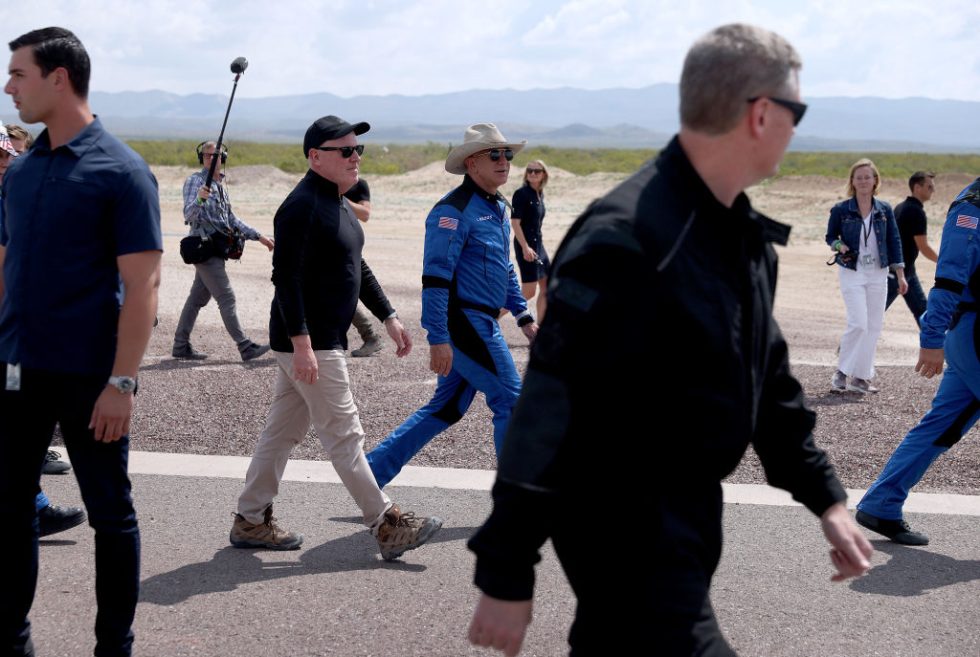
Enlarge / Blue Origin CEO Bob Smith (black hat) walks with Jeff Bezos after his flight on Blue Origin’s New Shepard into space.
Joe Raedle/Getty Images
With New Shepard in the background, Bezos and the blue flight suit-clad astronauts posed for photographs. Near the end of the photo session, Bezos called out, “Hey Bob, come here. You should be in the photo, too.” At this invitation, a smiling Bob Smith emerged from a small group of onlookers and stood in the middle of the four people who had just gone into space. Cameras clicked.
This gesture by Bezos hardly seemed to be that of someone dissatisfied with the CEO of his rocket company.
After the photo opportunity, Bezos climbed behind the wheel of his Rivian truck and drove right onto the landing site, making a circle around the rocket, before roaring off into the hazy desert, bound for points unknown. Kind of like his rocket company.
